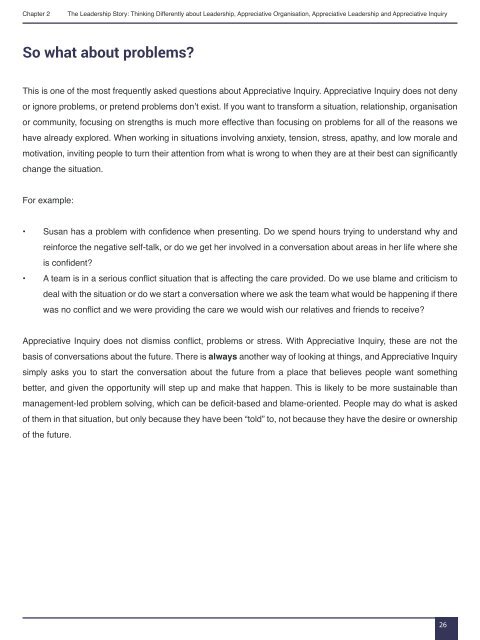Appreciative-Leadership
Appreciative-Leadership
Appreciative-Leadership
You also want an ePaper? Increase the reach of your titles
YUMPU automatically turns print PDFs into web optimized ePapers that Google loves.
Chapter 2<br />
The <strong>Leadership</strong> Story: Thinking Differently about <strong>Leadership</strong>, <strong>Appreciative</strong> Organisation, <strong>Appreciative</strong> <strong>Leadership</strong> and <strong>Appreciative</strong> Inquiry<br />
So what about problems<br />
This is one of the most frequently asked questions about <strong>Appreciative</strong> Inquiry. <strong>Appreciative</strong> Inquiry does not deny<br />
or ignore problems, or pretend problems don’t exist. If you want to transform a situation, relationship, organisation<br />
or community, focusing on strengths is much more effective than focusing on problems for all of the reasons we<br />
have already explored. When working in situations involving anxiety, tension, stress, apathy, and low morale and<br />
motivation, inviting people to turn their attention from what is wrong to when they are at their best can significantly<br />
change the situation.<br />
For example:<br />
• Susan has a problem with confidence when presenting. Do we spend hours trying to understand why and<br />
reinforce the negative self-talk, or do we get her involved in a conversation about areas in her life where she<br />
is confident<br />
• A team is in a serious conflict situation that is affecting the care provided. Do we use blame and criticism to<br />
deal with the situation or do we start a conversation where we ask the team what would be happening if there<br />
was no conflict and we were providing the care we would wish our relatives and friends to receive<br />
<strong>Appreciative</strong> Inquiry does not dismiss conflict, problems or stress. With <strong>Appreciative</strong> Inquiry, these are not the<br />
basis of conversations about the future. There is always another way of looking at things, and <strong>Appreciative</strong> Inquiry<br />
simply asks you to start the conversation about the future from a place that believes people want something<br />
better, and given the opportunity will step up and make that happen. This is likely to be more sustainable than<br />
management-led problem solving, which can be deficit-based and blame-oriented. People may do what is asked<br />
of them in that situation, but only because they have been “told” to, not because they have the desire or ownership<br />
of the future.<br />
26


